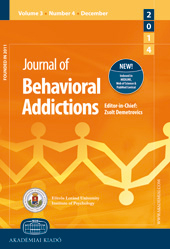Cognitive Distortions and ADHD in Pathological Gambling: A National Longitudinal Case-Control Cohort Study
Cognitive Distortions and ADHD in Pathological Gambling: A National Longitudinal Case-Control Cohort Study
Author(s): Lucia Romo, Cindy Legauffre, Alice Guilleux, Marc Valleur, David Magalon, Mélina Fatséas, Isabelle Chéreau-Boudet, Amandine Luquiens, Jean-Luc Vénisse, Jeu Group, Marie Grall-Bronnec, Gaélle Challet-BoujuSubject(s): Cognitive Psychology, Behaviorism, Psychoanalysis, Substance abuse and addiction
Published by: Akadémiai Kiadó
Keywords: cognitive distortions; gambling; ADHD; chasing; emotions; adults;
Summary/Abstract: The primary outcome of our study was to assess the links between the level of cognitive distortions and the severity of gambling disorder. We also aimed at assessing the links between patient gambling trajectories and attention deficit and hyperactivity disorder (ADHD). Materials and methods: The study population (n = 628) was comprised of problem and non-problem gamblers of both sexes between 18 and 65 years of age, who reported gambling on at least one occasion during the previous year. Data encompassed socio-demographic characteristics, gambling habits, the South Oaks Gambling Screen, the Gambling Attitudes and Beliefs Survey – 23, the Wender Utah Rating Scale – Child, and the Adult ADHD Self-report Scale. Results: The cognitive distortions with the greatest correlation to the severity of gambling disorder were the “Chasing” and “Emotions.” These two dimensions were able to distinguish between problem gamblers seeking treatment or not. While age of onset of gambling and length of gambling practice were not associated with the level of distorted cognitions, a period of abstinence of at least 1 month was associated with a lower level of distorted cognitions. The presence of ADHD resulted in a higher level of distorted cognitions. Conclusion: Cognitive work is essential to the prevention, and the treatment, of pathological gambling, especially with respect to emotional biases and chasing behavior. The instauration of an abstinence period of at least 1 month under medical supervision could be a promising therapeutic lead for reducing gambling-related erroneous thoughts and for improving care strategies of pathological gamblers.
Journal: Journal of Behavioral Addictions
- Issue Year: 5/2016
- Issue No: 4
- Page Range: 649-657
- Page Count: 9
- Language: English

